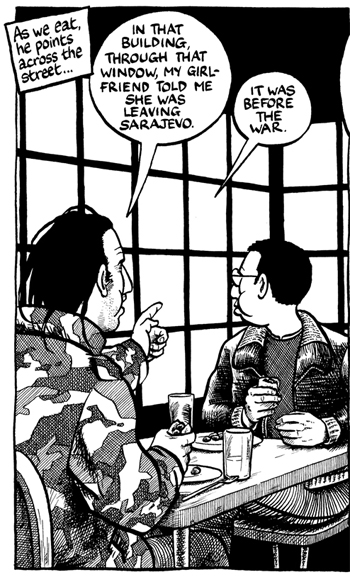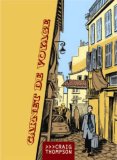 That’s Joe Sacco, to the right, looking out of the window in a restaurant in the old part of Sarajevo. As usual he is passive — listening to the stories that other people tell him, observing life around him and presumably taking notes, though in this frame, he doesn’t seem to have a notebook with him. He looks a lot like a — journalist. Oh. There’s no drawing pad, either. And that’s what usually separates him from other journalists: He is recording conversations,
That’s Joe Sacco, to the right, looking out of the window in a restaurant in the old part of Sarajevo. As usual he is passive — listening to the stories that other people tell him, observing life around him and presumably taking notes, though in this frame, he doesn’t seem to have a notebook with him. He looks a lot like a — journalist. Oh. There’s no drawing pad, either. And that’s what usually separates him from other journalists: He is recording conversations,
observations, scenes AND he’s drawing them.
By this particular moment in War’s End: Profiles From Bosnia 1995-96 (2005, Drawn and Quarterly Books), Sacco has drawn and interviewed his subject, Soba, a lot. He’s also drawn the streets of Sarajevo, the insides of clubs and restaurants and apartments. He’s proven to be sympathetic to Soba’s account of his combat against the Serb nationalists attempting to defeat the Bosnian independence movement — he’s listened, he’s drawn, he’s located himself in the narrative. And something wonderful has happened: We’ve gotten to know Soba.
Continue reading Thompson, Delisle, Sacco and comics non-fiction
 Except that maybe we’ve read Blankets, and we’re pretty sure that Craig is not going to be able to give himself over to that sort of thing. And in fact, Craig is unhappy for a lot of Carnet. He counts the ways: he’s homesick, he misses his ex-girlfriend profoundly, she’s quite ill, he’s lonely, everything reminds him of her, he’s lonely, his hand hurts from so much drawing. Did we mention he’s lonely? His internal struggles spill out into the frames and pages of his notebook, enveloping them in fog of gloom. Morocco, near the beginning of the trip, is especially difficult, primarily because he doesn’t know anyone, doesn’t understand the culture very well and plunges into the worst melancholy of the trip.
Except that maybe we’ve read Blankets, and we’re pretty sure that Craig is not going to be able to give himself over to that sort of thing. And in fact, Craig is unhappy for a lot of Carnet. He counts the ways: he’s homesick, he misses his ex-girlfriend profoundly, she’s quite ill, he’s lonely, everything reminds him of her, he’s lonely, his hand hurts from so much drawing. Did we mention he’s lonely? His internal struggles spill out into the frames and pages of his notebook, enveloping them in fog of gloom. Morocco, near the beginning of the trip, is especially difficult, primarily because he doesn’t know anyone, doesn’t understand the culture very well and plunges into the worst melancholy of the trip.